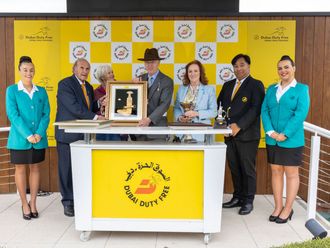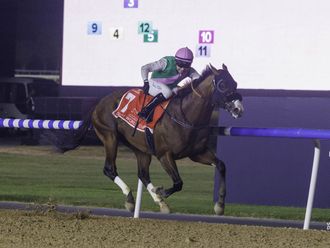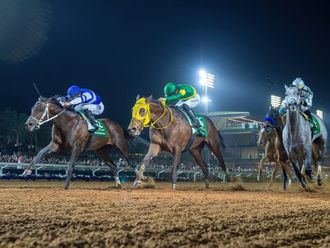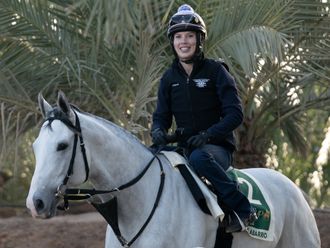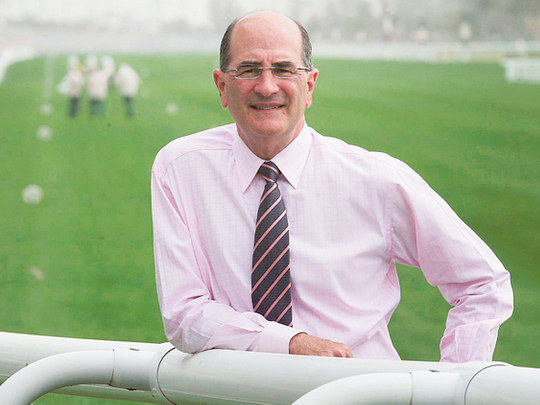
Dubai: Frank Gabriel Jr will be leaving the UAE after nine fruitful years at the helm of racing.
Highly respected for his impeccable work ethic and charisma as CEO of the Dubai Racing Club, Gabriel had, among several other accomplishments, overseen the highly successful transition from Nad Al Sheba Race Course to the iconic Meydan Racecourse in 2010.
With a clear mandate to raise the profile of racing in the Emirates, Gabriel certainly outdid himself in propelling the sport to the highest level on the global stage. Meydan now represents the fastest growing equine facility in the world and also boasts the world’s richest race meeting — the $27.5 million (Dh101 million) Dubai World Cup on March 29.
Gulf News spoke to Gabriel, who will join the New York Racing Association Inc (NYRA) as racing secretary for Belmont Park and Saratoga Race Course upon his return to America.
Excerpts:
Gulf News: Could you briefly tell us what was your role as CEO of the Dubai Racing Club?
Gabriel: I came here in 2005 to oversee the racing operations for the Dubai Racing Club, which also entailed the International Racing Carnival and the Dubai World Cup. That was my main role but of course it changed a little bit with the vision of trying to create a new race with Meydan. So I kind of stepped out of the realm and got involved, and learnt a little bit more about the construction of a race course.
What was your mission when you first came here nine years ago?
There was a great system and a great plan in place as far as the Dubai World Cup and Carnival were concerned and it was really just about trying to work closely with all the departments in improving and increasing the awareness and value of the great racing that we had. The aim was also to work closely with the senior management in order to increase the awareness about Dubai racing on the global market.
How much of a challenge was it to keep UAE racing on an upward curve?
It’s always a challenge with racing, or for that matter anything that you are involved with that has a great exposure and great value, to maintain that value or increase it. There were always challenges but with the support that the team gave me we were able to succeed.
How much credit can you take for boosting the status of the Carnival and the Dubai World Cup meeting?
I won’t take the credit, the credit goes to everyone that worked hard at it under the direction of the Board. I’m just somebody here to provide the direction and to support every department. Everybody contributed towards developing the quality programme of racing that we have to offer and the facilities that everyone finds enjoyable.
When you were presented with the task of supervising the building of Meydan Racecourse, how did you cope with the pressure? How much was there?
Well we worked many hours, that’s for sure, much to the loss of family time, which was pretty hard to take at the time. Thank goodness I had the support of my wife, Christine, without her, mentally or physically, I just don’t think that I could have really done it. I have to be conscious that she was the great vehicle for me to move forward and that she sacrificed a lot, and I appreciate what she did, and we got through it. But yes, it was a lot of hours, a lot of time, because we were on a fast clock to get the project open in Jan. 2010.
‘Hands on’ does your management style no justice at all. But that’s how people often refer to your work ethic. Did it come naturally to you?
Maybe it was the way I was brought up. Not everything is given to you, you have to work hard for it, but I’ve always learned to be respectful of people regardless of age or seniority, and hopefully, when you give respect you earn it back, and that’s the lessons I’ve always been taught. Definitely in the age of technology it’s very easy to text and email somebody, but I’m still a bit old school who likes to physically shake your hand and talk to you. I don’t think I will ever get away from that.
Are you happy with the fields for nine races on Dubai World Cup day?
There are some areas that we need to work on and look for a better field. But it’s what we have in the market, it’s what’s around us and sometimes you can’t create something that’s not there. I think when you look at the World Cup, the Duty Free and the Sheema Classic, they are fantastic races. Some of the new and some of the old races are equally good. I think the Gold Cup is quite a decent race and we start off with the Kahayla Classic, which is always a good one to watch. But the Godolphin Mile will be a very good start for the thoroughbred races on the card with three top horses — Soft Falling Rain, Variety Club and Shuruq — and a good field underneath it. Its going to be a good start to the programme.
Are you disappointed that the Americans have stayed away this year?
We are aware of that and we are sad that we’ve lost that amount of horses from the North American market. But the team will work hard on getting that rebuilt as we have seen a little bit of a decline over the years. There was a chance that we were going to get some top horses and then they just switched and went to Santa Anita. But we’re still going to work hard on it and keep working on the opportunities to get the best North American horses to compete on World Cup night.
Has it got anything to do with the Tapeta, will we one day revert to a sand track?
I’m afraid, that’s not a question that I can answer.
What do you think needs to be done to improve the domestic programme outside the Carnival?
Well, it’s a matter of population and quality. You can probably expand and get larger with more fixtures but you don’t want to get to a point where it’s really corrosive. We’ve got exposure out into the world from November through international wagers on races at Meydan and Jebel Ali and I think if that was to become unqualified as a quality product, you might tend to lose that interest. We’ve got it there and we want to maintain that. So I think it’s important to keep focused on maintaining good sized, quality fields and the quantity and to keep that level and then try to grow gradually with the local season.
It’s always hard to say goodbye. After nine long years in the UAE, what are your thoughts on leaving?
Somebody asked me that the other day and I think to be quite honest I’m so busy with the World Cup and the trip to China the week after, that I haven’t really had the time to sit down and relax. It will probably happen when I get on the plane and fly out. That’s when it will probably hit me. But I’m very honoured by His Highness Shaikh Mohammad Bin Rashid Al Maktoum, Vice-President and Prime Minister of the UAE and Ruler of Dubai, the Maktoum Family, the Board Members, Mr Saeed Al Tayer and Malih Al Basti, for all their support. I’m very appreciative of that and for being given the opportunity to work in Dubai and I hope that I was able to give something back to the country.


